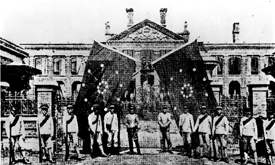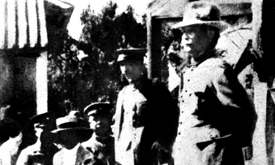|
 |
 |
|
REVOLUTIONARY PIONEERS: Revolutionaries raise flags after taking over Wuchang City in Hubei Province on October 10, 1911 (XINHUA) |
COMMANDER IN CHIEF: Dr. Sun Yat-sen inspects troops in Shaoguan, Guangdong Province, before his government launched the Northern Expedition to fight warlords and imperialists in north China in September 1924 (XINHUA) |
But its failures not withstanding the 1911 Revolution was of great historical significance, for it opened China's door to progress and emancipated people's thoughts. The once supreme and divine autocratic monarchy was denounced as evil and backward, and the common people long subject to feudal rule were declared to be the masters of the country.
While drafting the provisional constitution of the Republic of China founded after the 1911 Revolution, Sun insisted on adding a clause stating the sovereignty of the newly founded republic belongs to all its people. This had a great and far-reaching impact on the politics of China, as it made the establishment of future dictatorships impossible.
The 1911 Revolution also changed people's moral outlook, social customs and living habits. For instance, people no longer had to kneel to officials. Men no longer braided their hair, and women no longer bonded their feet. Planting and smoking opium was banned. Science was promoted and superstitious activities were opposed. These efforts reinvigorated the people and greatly changed the social environment.
The 1911 Revolution promoted social and economic development in China. The new republican government promulgated policies and regulations to boost industrial and commercial growth, which brought about an economic boom. In the early years of the 1910s, the scale of industrial production far exceeded the aggregate production of the last few decades of the late Qing Dynasty. Obvious progress was made in the fields of public health, education and the development of the press.
The revolutionaries actively sought to build a united nation. In the build up to the revolution, they put out anti-Manchu slogans, yet they were essentially opposed to the autocratic monarchy dominated by Manchurian aristocrats, not to the Manchurian people as a whole. After the demise of the Qing Dynasty, the revolutionaries stressed their wish to eradicate ethnic inequality and promote national harmony. Sun said equality among all ethnic groups in China was essential for common prosperity and China's role in maintaining world peace.
The 1911 Revolution also created the conditions for the birth of the Communist Party of China (CPC), which came into being 10 years after 1911. The two significant historical events were intrinsically linked.
The mind emancipation movement after the 1911 Revolution facilitated the dissemination of various political and social theories, including Marxism. After the bourgeoisie's dream to establish a republic was smashed people began to seek new paths, and some chose socialism.
The development of national capitalism after the 1911 Revolution boosted the growth of the proletariat, an important social class for the CPC. Some early CPC members either actively participated in the 1911 Revolution or were inspired by it. Since its inception, the CPC has always regarded its undertaking as a continuation and extension of the 1911 Revolution.
After the turn of the 20th century, China has gone through three dramatic historical changes, namely the 1911 Revolution, the founding of the People's Republic of China in 1949, and the reform and opening up in the past three decades. The three historical changes are like staircases, and China had to scale them one after another to reach a higher stage of development.
The 1911 Revolution participants' heroism is a valuable spiritual asset of the Chinese nation. To change the destiny of the Chinese nation and build a strong and prosperous country, Sun and his comrades-in-arms risked their lives participating in a struggle rife with hardship and dangers. Many sacrificed their lives but the movement persevered and continued to pursue its lofty goals.
For instance, Qiu Jin (1875-1907), a female revolutionary killed by the Qing court after leading an uprising in her hometown in Zhejiang Province, said she was prepared to die for the cause.
The revolutionaries cared about the people, and were determined to benefit the people. Sun once said the aim of the revolution was to free people of their worries and make them happy. When criticized and told that the revolution would only destroy and not create, the revolutionaries replied only after corrupt political power was toppled could the people be adequately fed and clad.
The revolutionaries monitored global developments and looked at things from an international perspective. While thinking about the destiny of their country, Sun and his comrades-in-arms usually took into consideration the international situation, and made decisions that accorded with the trends of the time. Sun said to solve China's problems, it was necessary to learn from other countries' strengths.
Sun himself also advanced with the times. He had gradually changed his mind from peaceful reform to armed rebellion against the Qing court, from seeking a bourgeoisie republic to following the path of Soviet Russia. While he initially relied on some warlords to implement policies, Sun eventually made his three great policies of alliance with the Soviet Union, cooperation with the CPC and assistance to the workers and peasants in January 1924.
The revolutionaries were keenly aware of China's historical responsibility in contributing to mankind's development. In 1904, Sun wrote a letter to the American people, saying if the revolutionaries' goals were achieved China and all human beings would have a brighter future.
Today, the spiritual forces that drove the revolutionaries a century ago still propel the Chinese people to continue to build a stronger country.
The author is a professor at the Renmin University of China | 